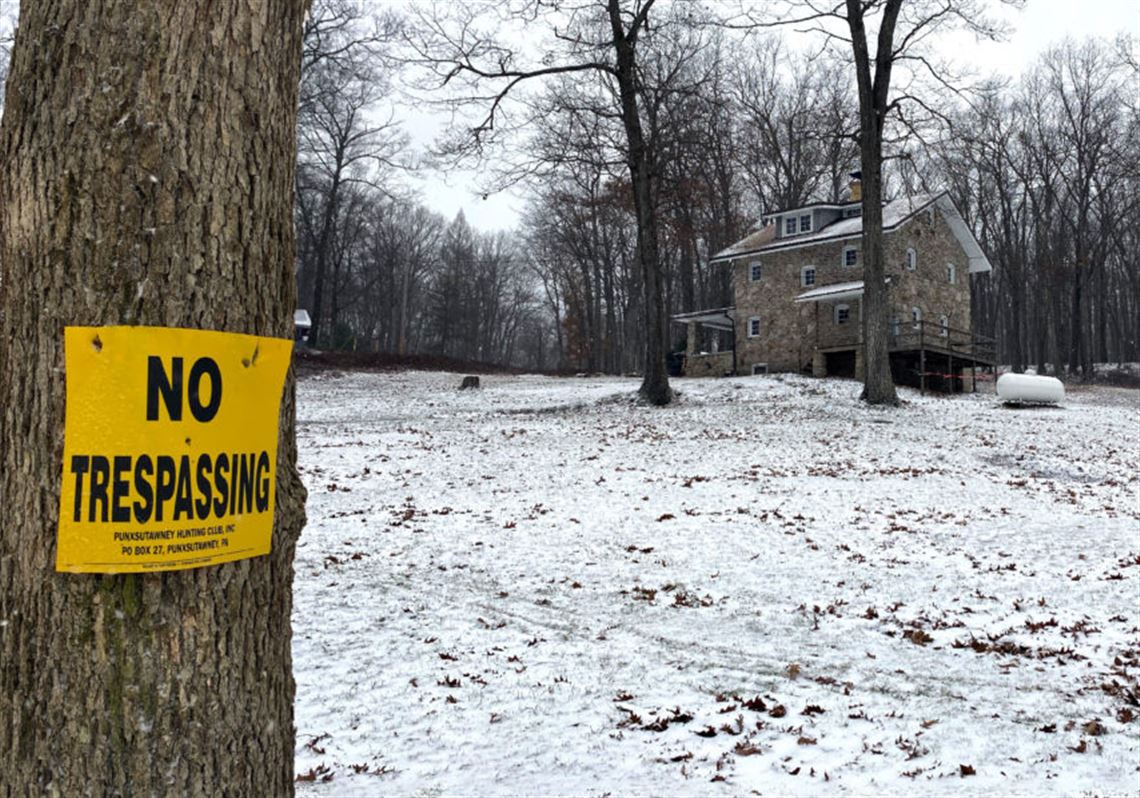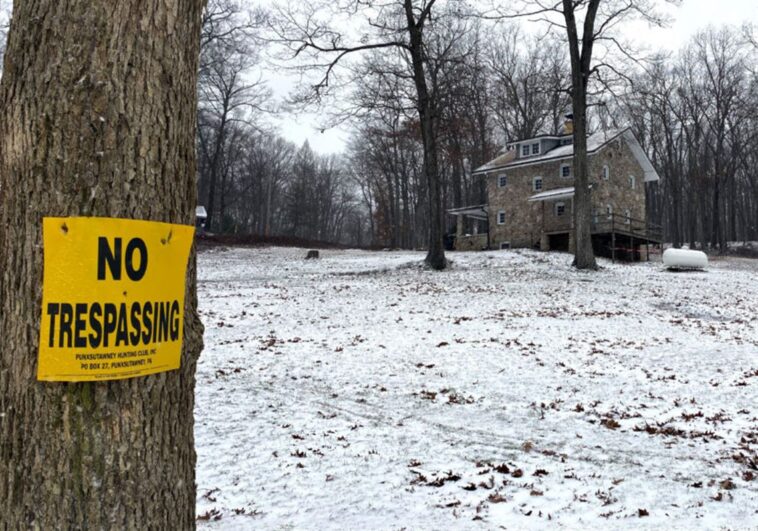
Constitutional Debate Over Private Land Access
The Pennsylvania Supreme Court is currently examining a politically charged issue that pits private property rights against the authority of the state’s Game Commission. At the heart of the matter is whether game wardens should be allowed to enter privately owned, posted land without warranted action or probable cause. This topic is both full of problems and tense, reflecting the small distinctions between public interest and private rights.
The legal showdown is a result of arguments presented by two private hunting clubs in Clearfield County—the Punxsutawney Hunting Club and the Pitch Pine Hunting Club. Both clubs contend that the statutory provisions in the Pennsylvania Game and Wildlife Code infringe on constitutional guarantees by permitting game wardens to enter private property routinely. Represented by Joshua Windham of the Institute for Justice, the clubs argue that these provisions contravene Article 1, Section 8 of the state Constitution. This case brings to the fore several tricky parts of law enforcement, property rights, and the practical application of legal doctrines that stretch back nearly a century.
Application of the Open Fields Doctrine in Pennsylvania
A central component of this legal dispute is the open fields doctrine, a legal principle that dates back to 1924. This doctrine holds that a warrant is not needed for the search of an open field, despite its implications for personal privacy. The court’s interpretation of this doctrine has far-reaching consequences, influencing how game wardens conduct their duties and how private landowners can secure their properties. Under this doctrine, game enforcement officials argue that their actions fall well within longstanding legal precedents.
However, detractors of this approach—like the hunting clubs involved—insist that the doctrine should not extend to private, marked properties that have been clearly designated as off-limits for intruders. The clubs argue that their land, which includes multiple security measures such as posted no trespassing signs, locked gates, and even trees marked with purple paint, should be exempt from what they consider a routine police-like search. This viewpoint highlights the subtle parts of the broader debate on how historic legal precedents should be applied in the modern context of private property rights.
Practical Implications for Private Landowners
The practical effects of such legal interpretations carry significant consequences for private landowners across Pennsylvania. Many landowners invest considerable time and resources to secure their property. They install signs, barriers, and adopt various strategies aimed at keeping intruders away. For the hunting clubs, which have reported at least 22 documented instances of unauthorized entries by game wardens—and even the use of a trail camera to monitor their land—the issue is more than legal theory. It is a tangible encroachment upon what they consider their secure domain.
From a landowner’s perspective, the stakes in this debate are incredibly high. If a ruling were to favor the current statutory provisions, landowners would have to contend with the reality that their property rights could be undermined by government officials acting under a broad interpretation of rules developed nearly a century ago. This places landowners in a nerve-racking situation where the protection afforded to them by title might ultimately be superseded by enforcement measures that are, in their view, overreaching.
Historical Context and Open Fields Precedent
To understand the present concerns, it is necessary to take a closer look at the history of the open fields doctrine. Established in a 1924 ruling, the doctrine was initially intended to provide a practical framework for search and seizure in rural spaces, where the expectation of privacy was considered less significant than in a home. The doctrine has since remained largely intact, and the U.S. Supreme Court has consistently respected its principles over the decades.
This century-old precedent has become a foundation for how law enforcement, and in this case, game wardens, approach their work. While the practical elements of animal conservation and wildlife regulation are well recognized, the historical roots of the doctrine now come under intense scrutiny in an era where private property rights are championed more vigorously than ever before. This example of judicial deference to tradition offers a stark illustration of the tensions between inherited legal doctrine and evolving societal standards regarding privacy and individual rights.
Legal Arguments from the Hunting Clubs
Representing the hunting clubs, attorney Joshua Windham presented a series of arguments emphasizing that private property rights should be maintained even when state interests are at play. Windham accepted that enforcing game laws is essential and that the state indeed has a duty to ensure these laws are respected. However, he argued that the means by which the Pennsylvania Game Commission enforces its policies must be tempered by the need for a reasonable threshold—a requirement along the lines of having probable cause or at least reasonable suspicion before any intrusion occurs.
Windham’s legal contention is anchored in a belief that the existing laws cause property rights to “vanish” on private land. He claims that while game laws are important, their enforcement should not involve any unnecessary and nerve-racking invasions of privacy. The argument rests on a longstanding constitutional protection, asserting that the current system erodes the guarantees provided to landowners and sets dangerous precedents about the limits of state authority.
This reasoning introduces several fine points that demand a thoughtful balancing of state power with individual rights. Windham’s critique serves as a reminder that even well-intentioned state regulations can, when left unchecked, lead to overreach that places private rights on a precarious footing.
Government Perspective on Wildlife Enforcement
On the other side of this contentious issue stands the Pennsylvania Game Commission. Represented by Anthony Kovalchick, deputy attorney general for the state, the Commission defends the existing legal framework. Kovalchick argues that over a hundred years of legal precedent—beginning with the open fields doctrine—support the actions of game wardens as both reasonable and necessary for enforcing wildlife and hunting laws across the Commonwealth.
From the state’s standpoint, the routine activities of game wardens, which include patrolling, monitoring, and even documenting potential illegal practices such as the unlawful baiting of wildlife, are critical measures taken to ensure that hunting laws are uniformly observed. In instances where game cameras or other monitoring devices are utilized, the Commission maintains that these measures are essential to preserving the integrity of wildlife regulations and protecting natural resources for future generations.
In this context, Kovalchick points out that the enforcement of animal protection laws is not analogous to a criminal investigation. The use of open fields doctrine underlines the state’s right to conduct regulatory inspections without the same burden of probable cause that would be required in a criminal context. The emphasis here is on the overall well-being of the wildlife population, which is seen as being under significant threat without proactive regulation and monitoring.
Balancing Private Rights and Public Interests
The debate over land access is emblematic of a broader struggle—to strike the right balance between private rights and public interests. On one hand, there is a clear need to protect individual property rights, essential for the peace of mind of landowners who invest in security measures. On the other hand, the state has a compelling argument that robust wildlife enforcement practices are super important for maintaining ecological balance and ensuring that hunting laws are followed to protect vulnerable species.
This balancing act involves considering several subtle details. For instance, the degree to which private property is marked and secured might influence the expectations of privacy that a landowner is entitled to. Here is a quick breakdown of the competing priorities:
- Private Property Security: Landowners implement tangible measures such as locked gates, no trespassing signs, and physical barriers to indicate that their property is off-limits.
- Enforcement of Wildlife Laws: State officials argue that allowing routine, warrantless inspections helps prevent illegal activities such as baiting, overharvesting, and other breaches of game laws.
- Legal Precedents and Doctrines: Historical rulings provide the legal backbone for the state’s actions, even if they might seem intimidating when applied in modern, private contexts.
This table summarizes some of the key contrasting positions:
| Aspect | Private Landowner Standpoint | State Enforcement Standpoint |
|---|---|---|
| Right to Privacy | Strong expectation of privacy due to physical security measures | Limited due to doctrine application; enforcement duties prevail |
| Legal Precedent | Calls for updated interpretations reflecting modern property concerns | Relies on historical doctrines dating back to 1924 |
| Enforcement Measures | Views regular inspections and trail camera usage as intrusive | Frames such measures as necessary for ensuring compliant wildlife management |
| Requirement for Entry | Advocates for probable cause or reasonable suspicion before entry | Maintains that routine patrols do not require warrants under current law |
The Road Ahead: Policy and Enforcement Reforms
As the Pennsylvania Supreme Court takes this issue under advisement, both sides are acutely aware of the nerve-racking potential for change. Depending on the outcome, the current enforcement practices could undergo substantial adjustments. For instance, if the court finds in favor of requiring probable cause or a warrant, game enforcement officials might need to adopt a significantly modified approach. This could involve direct engagement with landowners prior to any search—essentially, requesting permission or verifying circumstances on a case-by-case basis.
On the flip side, should the court endorse the existing legal framework, it could reinforce what many view as a crucial tool in the arsenal for protecting wildlife. Either way, policymakers and enforcement officials will need to adapt to any new guidelines, steering through a period of transition fraught with both legal and operational complications. This possibility underscores how the decision could serve as a benchmark for future cases involving state intervention on private land.
Among the potential changes, experts suggest the following measures to ease tensions on both sides:
- Review of Enforcement Protocols: A comprehensive reexamination of the circumstances in which game wardens can enter private property could lead to more balanced approaches.
- Enhanced Communication Channels: Establishing protocols for notifying property owners about patrols or planned searches could reduce feelings of harassment and intrusion.
- Legislative Amendments: Lawmakers may consider crafting new statutes that better define the scope and limits of game enforcement actions on private property.
Common Misunderstandings Regarding Game Laws
One of the confusing bits in the broader discussion is the various misconceptions about what game laws actually allow. Many private landowners may not be fully aware of the fine points of these laws. They might overestimate the reach of governmental powers or misunderstand the intended application of doctrines like the open fields doctrine.
It is important for both sides of the debate that public education efforts are enhanced to clarify these issues. Misunderstandings can lead to heightened tensions and distrust between the general public and enforcement agencies. Addressing these small distinctions openly could help reduce the off-putting nature of the current dispute and allow for more constructive dialogue.
Some common misunderstandings include:
- The Scope of the Open Fields Doctrine: Many believe that this doctrine allows unrestricted entry onto any private property, whereas in reality it is intended only for open, rural fields without the same reasonable expectation of privacy as areas clearly set apart as personal living spaces.
- Definition of ‘Private Property’: There is often ambiguity regarding which portions of a property are deemed private, especially when some areas might be set aside for public hunting or other regulated activities.
- Necessity Versus Incursion: The intent behind the game laws is to protect wildlife and regulate hunting practices. However, landowners may see enforcement actions as intrusions rather than necessary safety measures.
Stakeholder Perspectives: A Closer Look at the Nitty-Gritty
When we take a closer look at the viewpoints expressed by stakeholders, several themes emerge. Landowners and private hunting clubs often feel that the state’s actions, though intended to safeguard wildlife, inadvertently trample upon their personal liberties and their ability to control their property. This is not merely a legal dispute but also an emotional one, as property owners see their hard-earned investments and privacy being compromised.
From the state’s perspective, however, these measures are seen as critical actions needed to enforce a host of important wildlife and hunting regulations. The state contends that these actions are not equivalent to criminal searches but are administrative measures designed to ensure compliance with established game laws. This point of view stresses the importance of the law’s role in preserving the balance between human interests and environmental protection.
Below is a bulleted list that captures the essence of both stakeholder perspectives:
- Private Hunting Clubs:
- Feel a sense of violation when state officials enter secure areas without clear cause.
- Advocate for a requirement of probable cause or direct consent before any property inspection.
- Frustrated by what they perceive as a disregard for their established property boundaries and security measures.
- State Enforcement Officials:
- See their work as a necessary part of upholding important wildlife protection measures.
- Rely on longstanding legal precedents, like the open fields doctrine, to justify routine inspections.
- Emphasize that their actions are administrative in nature rather than criminal investigations.
Impacts on Rural Communities Across Pennsylvania
For many rural communities, hunting is not just a recreational activity; it is a way of life. In these areas, a delicate balance exists between private property rights and community-based wildlife management. The current debate is making clear that there are many tangled issues at play, and its outcome will likely have long-term ramifications. The enforcement practices invoked by the Game Commission have been part of life for decades, but ongoing technological advances and changing attitudes towards privacy necessitate a re-evaluation of these practices.
In rural communities, the impact can be felt in several ways:
- Community Trust: A ruling that favors the state’s current practices might undermine trust between community members and local enforcement agencies.
- Economic Investments: Landowners who invest in security measures and land improvements see their rights compromised if enforcement practices are perceived as excessive.
- Conservation Efforts: Well-managed wildlife conservation relies on balancing regulatory enforcement with respect for property rights, influencing both local economies and environmental health.
Preparing for Future Legal and Legislative Changes
Considering the ongoing debate, it is super important for both government agencies and private property owners to prepare for potential changes to the legal framework governing game law enforcement. The upcoming decision by the Pennsylvania Supreme Court could be a catalyst for legislative review and reform. Both sides are likely to face a period of adjustment, requiring them to find a new path forward amid legislative amendments and shifts in established practices.
Here are some steps that policymakers and stakeholders might consider:
- Dialogue and Mediation: Establish forums where landowners, hunting clubs, and state officials can meet to discuss concerns and devise mutually acceptable protocols. Direct communication can help manage the tense aspects of this debate.
- Legislative Review: Convene expert panels to examine the existing Game and Wildlife Code provisions, specifically looking at whether the open fields doctrine should be applied in its current form or updated to reflect modern privacy expectations.
- Educational Initiatives: Roll out public campaigns to explain the legal bases of current practices, highlighting which pieces of law support the state’s actions and where there’s potential for reform.
- Revised Enforcement Guidelines: Develop new guidelines for game wardens that incorporate best practices learned from other jurisdictions, ensuring that any intervention on private property complies with an enhanced standard of reasonable suspicion and respect for individual rights.
Taking these steps can help move the conversation away from adversarial standoffs and towards constructive reform. By working together, both sides may be able to establish protocols that protect wildlife while also respecting the essential rights of property owners.
Working Through Legal and Operational Complications
The current legal debate is emblematic of the many tangled issues faced when state power intersects with individual rights. The enforcement of game laws involves not only the preservation of wildlife but also the maintenance of property rights, placing officials in the middle of a nerve-racking balancing act. This situation requires that both the state and the landowners take a closer look at what each party stands to lose if mutually acceptable solutions are not found.
Operational complications also arise for enforcement agencies if stricter rules on accessing private property are imposed. The state must consider how a change in practice will impact not just individual cases but overall compliance with conservation regulations. Some of the practical challenges include:
- Reevaluating how patrols are conducted on privately marked properties.
- Determining when a warrant or probable cause should be required for administrative searches.
- Training game wardens on new protocols that balance state interests with private rights.
These are not simple tasks. As the state looks to steer through regulatory shifts, officials must figure a path that honors long-standing doctrines while adapting to modern realities. Such adjustments, while intimidating, may ultimately lead to a more balanced approach—one that protects both wildlife and individual liberties.
Opportunities for Constructive Dialogue and Reform
The debate over the Game Commission’s access to private property is more than just a legal squabble—it presents a unique opportunity for constructive dialogue and reform. Legislators, legal experts, landowners, and conservationists all stand to benefit from creating a safer, clearer set of rules that respects private property rights while still preserving the essential functions of wildlife management.
Constructive dialogue can lead to:
- Enhanced Legal Clarity: Refined definitions of what constitutes private property under the Game and Wildlife Code can help reduce misunderstandings about its enforcement.
- Stronger Community Relations: Building trust between local communities and state agencies can improve cooperation beyond the courtroom.
- Improved Enforcement Practices: Updating protocols may provide game wardens with clearer guidelines that uphold law while avoiding the impression of unwarranted intrusion.
- Future-proofing Regulations: Modernizing laws to reflect contemporary values surrounding privacy and technology can ensure that enforcement remains relevant and respectful.
Both the state and the private sector have a role to play in shaping a balanced future for wildlife management and property rights. The outcome of the Pennsylvania Supreme Court’s decision, regardless of its final ruling, may pave the way for renewed discussions at multiple levels of government and among various stakeholder groups.
Conclusion: Finding a Path Through Nerve-Racking Legal Terrain
In summary, the Pennsylvania Supreme Court’s examination of the Game Commission’s right to access private property raises far more than just academic questions. It challenges traditional legal doctrines and calls into question whether longstanding state practices are acceptable in today’s rapidly evolving societal landscape. From the perspective of private landowners, these actions are not simply about enforcing hunting regulations; instead, they are seen as an infringement upon hard-earned property rights and a violation of the delicate balance between individual freedom and state authority.
From the game enforcement perspective, however, the same practices are portrayed as essential safety measures—key components designed to protect wildlife and ensure that hunting laws are followed. The open fields doctrine, with its century-old legacy, remains a cornerstone of this enforcement strategy, yet its application in the modern era is increasingly seen as one of the confusing bits that needs reexamination.
The challenge moving forward is to find a compromise where the state can maintain its supervisory role over wildlife protection without subjecting law-abiding property owners to what many view as an overwhelming intrusion. It is a task loaded with issues, given the history, contentious public opinions, and the evolving legal environment surrounding privacy and property rights.
In navigating this nerve-racking terrain, the Pennsylvania Supreme Court’s pending decision could serve as a landmark moment—a turning point that clarifies the fine shades of legal interpretation while reaffirming the need for a balanced approach that respects both state interests and the rights of private individuals. Both sides must now work together to come up with a framework that not only adheres to established legal precedents but also adapts to modern expectations of privacy, thereby ensuring that both wildlife and personal freedoms are adequately protected.
As this case continues to unfold, it remains critical for all involved—government officials, private property owners, legal experts, and community members—to keep the lines of communication open, facilitate constructive dialogue, and take the time to get into the subtle details that can ultimately define how our laws will operate in a modern, interconnected society. Only through thoughtful, informed debate can the tangled issues at hand be truly resolved.
Originally Post From https://www.goerie.com/story/sports/outdoors/2025/04/10/can-game-wardens-access-private-property-without-a-warrent-open-fields-doctrine-pa-supreme-court/83010865007/
Read more about this topic at
Intrusion | The First Amendment Encyclopedia
Physical Invasion of a Neighbor’s Property


